|
|
|
Sort Order |
|
|
|
Items / Page
|
|
|
|
|
|
|
| Srl | Item |
| 1 |
ID:
129194
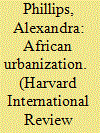

|
|
|
|
|
| Publication |
2014.
|
| Summary/Abstract |
Eko Atlantic is a city that rises "like Aphrodite from the foam of the Atlantic," wrote Nobel Prize winner Wole Soyinka. The city is defined by sustainability, luxury, technology, and economic opportunity. It is Africa's own Dubai; a gleaming gateway to the continent that will revolutionize the city of Lagos, solidifying its place as West Africa's financial center. The private development, which is located on land reclaimed from the Atlantic Ocean along
Lagos' upscale Bar Beach coastline, is predicted to house 400,000 residents and to provide over 150,000 jobs. Eko Atlantic is ushering in a wave of futuristic African cities. These modern satellite cities are built on the edge of existing metropolises in the hopes of transforming the country's economy and its role in the global marketplace. For example, developers are building Hope City outside Accra and Konza Techno City, known as "Africa's Silicon Savannah," outside Nairobi, in the hopes to turn Ghana and Kenya respectively into major players in the technology industry. African urbanization is occurring at a breakneck pace, and if done right, presents a valuable and unique opportunity to create jobs and lift millions out of poverty. However, if done wrong, the urban poor could become increasingly marginalized as slums are cleared to make way for housing they cannot afford and the mobile upper class migrates to upscale edge cities such as Eko Atlantic. Africa has the chance to urbanize in a way that increases the total populace's aggregate quality of life rather than deepening the divide between the tiny elite and the vast urban poor, but corruption and poor urban planning must first be overcome.
|
|
|
|
|
|
|
|
|
|
|
|
|
|
|
|
| 2 |
ID:
129202
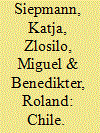

|
|
|
|
|
| Publication |
2014.
|
| Summary/Abstract |
The Chilean Presidential and Parliamentary elections of the first-round general election on November 17th and the second round run-off for the presidency between remaining candidates Michelle Bachelet and Evelyn Matthei on December 15th, 2013 were decided by problems, not by ideology, and by past rather than future issues. These issues, partly hidden from the international public, are likely to remain over the next years. Thus comprehending them is crucial to understand the transition of the country.
|
|
|
|
|
|
|
|
|
|
|
|
|
|
|
|
| 3 |
ID:
129193
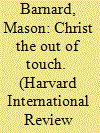

|
|
|
|
|
| Publication |
2014.
|
| Summary/Abstract |
A majestic, powerful figure, Christ the Redeemer stands far above the Brazilian city of Rio De Janeiro-a physical manifestation of the power and authority of the Catholic Church. Upon its completion in 1931, the statue symbolized the hope and prosperity of Catholicism in Latin America. But no longer. In the slums and favelas below Christ's welcoming embrace, fewer and fewer turn towards the Catholic faith for solace.
Protestantism and similar, more liberal Christian sects continue to grow across the region-a result of long term demographic changes. A wide variety of missionary groups, primarily Evangelicals from North America, arrive each year to successfully spread the faith in areas with little influence from the church or the state. Over 50,000 Evangelicals ar- rive in Honduras alone each year. Without social services, missionaries fulfill a critical role in providing infrastructural
|
|
|
|
|
|
|
|
|
|
|
|
|
|
|
|
| 4 |
ID:
129191
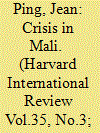

|
|
|
|
|
| Publication |
2014.
|
| Summary/Abstract |
In order to better understand what happened in Mali in 2012 and to seek appropriate solutions to the major obstacles facing this country, it is necessary to recall the nature and causes of the numerous challenges confronting the nation. these vital concerns relate to ethnicity, secession, terrorism, coups, governance, poverty, corruption, drought and climate change. These factors affect not only Mali but also represent obstacles faced by a multitude of other countries on the continent. However, in the case of Mali, these issues were all brought together in the same place and brutally erupted at the same time during the course of the year 2012, provoking disintegration and the subsequent French military intervention.
|
|
|
|
|
|
|
|
|
|
|
|
|
|
|
|
| 5 |
ID:
129200


|
|
|
|
|
| Publication |
2014.
|
| Summary/Abstract |
Kivalina is an Inupiat village of 350 people that sits on two square miles of doomed Alaskan coastline. the state of Alaska and the US government consider Kivalina imminently threatened by climate driven erosion and flooding, and the village must relocate very soon so service. every year, Kivalina is battered by hurricane strength storm system twice the size of Texas that threaten to wash the tiny village away.
|
|
|
|
|
|
|
|
|
|
|
|
|
|
|
|
| 6 |
ID:
129199


|
|
|
|
|
| Publication |
2014.
|
| Summary/Abstract |
Imagine subsistence hunters in Brazil, or farmers in the Andean highlands, or fishing communities in Cambodia. Each of these geographically disparate groups is among the indigenous peoples of the world whose livelihoods, cultures, and identities are intimately tied to the land on which they have lived for generations. However, they do not only share this tie to their traditional land. Indigenous peoples' rights to their land, territories, and natural resources have often been historically ignored or neglected when large-scale development or conservation activities, such as hydropower dams or protected areas, were being planned and implemented.
Conservation and development activities have the potential to negatively or positively impact the rights of indigenous peoples, both at very small or very large scales. Notably, data from the Global Environment Facility (GEF) shows that land under the management of indigenous peoples only makes up 20% of the world's landmass and yet it holds roughly 80% of the Earth's remaining biodiversity. This biodiversity and related traditional knowledge, which has been maintained, used, catalogued, and respected for thousands of years by many indigenous peoples, has the potential to maintain cultures, help agricultural systems adapt to a changing climate, offer medical solutions, and inspire awe. However, anything this traditional knowledge may offer the rest of the world, including the biodiversity it has maintained, must be provided with the consent of the indigenous peoples to which it belongs.
|
|
|
|
|
|
|
|
|
|
|
|
|
|
|
|
| 7 |
ID:
129195
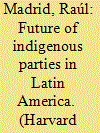

|
|
|
|
|
| Publication |
2014.
|
| Summary/Abstract |
After a long period of relative quiescence, indigenous movements in Latin America have mobilized. A wave of indigenous protests swept through the Andean countries beginning in the 1980s and made its presence felt as far north as Mexico. Indigenous groups have blocked roads, occupied buildings, and held mass rallies to let their demands be known. They have also entered the electoral arena in unprecedented numbers. Some indigenous groups and leaders have allied with non-indigenous parties, lending their support to the parties in exchange for candidacies or policy concessions. Other indigenous groups have opted to form their own political parties. In Bolivia, Colombia, Ecuador, and Guatemala, indigenous parties have launched presidential campaigns and in a host of other Latin American countries indigenous parties have competed in legislative or municipal elections.
Bolivia's Movement toward Socialism, known as the MAS for its Spanish initials, has been the most successful of the indigenous parties. The MAS has dominated Bolivian politics since 2005, winning every major election since that time. Its leader, Evo Morales, has occupied the presidency for the last eight years, and the MAS currently controls both houses of the Bolivian legislature as well as most of the country's departments.
|
|
|
|
|
|
|
|
|
|
|
|
|
|
|
|
| 8 |
ID:
129203


|
|
|
|
|
| Publication |
2014.
|
| Summary/Abstract |
The Global Fund to Fight AIDS, Tuberculosis, and Malaria is one of the world's largest funders of global health programs. From 2002 to 2011, the Global Fund disbursed about US$15.5 billion to support programs aiming to prevent and treat the three diseases, to care for the people suffering from them, and to strengthen health systems in more than 150 low- and middle-income countries. At its replenishment meeting this December, the Global Fund pledged $12 billion to supporting programs through 2016. Yet, while the Global Fund has made important contributions to the fight against AIDS, tuberculosis, and malaria over the past decade, each year over 3 million people still die from these three diseases. Millions more suffer from extended periods of sickness. Only about half of people eligible for anti-retroviral (ARV) medicines in developing countries actually enroll in treatment. It is therefore worth remembering that the same moral imperative that drove the creation of the Global Fund over a decade ago also compels the Fund and its partners to do whatever they can to ensure that the billions of dollars the Fund raises and disburses reduce the disease burden as efficiently as possible
|
|
|
|
|
|
|
|
|
|
|
|
|
|
|
|
| 9 |
ID:
129201
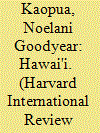

|
|
|
|
|
| Publication |
2014.
|
| Summary/Abstract |
The lawful Government of Hawaii was overthrown without the drawing of a sword or the firing of a shot by a process which, it may be safely asserted, is directly traceable to and dependent for its success upon the agency of the United States acting through its diplomatic and naval representatives…By an act of war, committed with the participation of a diplomatic representative of the United States and without authority of Congress, the Government of a feeble but friendly and confiding people has been overthrown. A substantial wrong has thus been done which a due regard for our national character as well as the rights of the injured people requires we should endeavor to repair.
|
|
|
|
|
|
|
|
|
|
|
|
|
|
|
|
| 10 |
ID:
129197
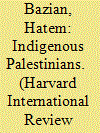

|
|
|
|
|
| Publication |
2014.
|
| Summary/Abstract |
On November 10th, 2013, the Israeli cabinet voted in a special session to authorize the demolition and removal of Umm al-Hiran, an "unauthorized," Palestinian Bedouin village in the Negev Desert, and to build in its place a new community for national Jews to be named Hiran, which had been planned and approved in early 2002. The stated reason for this demolition and forceful eviction is the lack of permits for the existing settlement, with Umm al-Hiran being one of a number of Palestinian Bedouin communities that were settled without permits and are currently subject to intense Israeli plans for removal. Umm al-Hiran itself was set-up in early 1956 by the Palestinian Abu-Alkian tribe after they had been forced to move from their ancestral tribal lands near Kibbutz Shoval in the Northern Negev.
A more critical development related to this event is the Israeli Parliament's passing of the first reading of the Prawer law. If the plan wins final approval, as it appears it will, it would cause the forceful displacement of 40,000-70,000 Arab Bedouins from the Negev, the confiscation of 800,000 dunams of Arab land, the razing to the ground of 36 or more Arab villages, and the dispossession of another generation of Palestinians. According to Adallah, the Legal Center for Arab Minority Rights in Israel, the "underlying premise of the draft bill is that there is no Bedouin land ownership," effectively negating the "population's right to property and historic affinity to the land." At the heart of this matter is the ongoing contestation of Palestinian land rights, with the Israeli government using its authority to define these policies to favor the Jewish population over the Arab. Thus, this bill, like others before it, "promotes the principle of segregation along the lines of ethnic affiliation and labeling."
|
|
|
|
|
|
|
|
|
|
|
|
|
|
|
|
| 11 |
ID:
129198
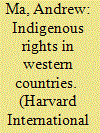

|
|
|
|
|
| Publication |
2014.
|
| Summary/Abstract |
The Canadian government has always tried to maintain Canada's reputation as a beacon of democracy and of a model of social contract theory. But James Anaya, the United Nations' special rapporteur on indigenous rights, may be challenging the impeccable Western democratic image that the international community has so liberally applied to the United States' northern neighbor.
|
|
|
|
|
|
|
|
|
|
|
|
|
|
|
|
| 12 |
ID:
129196


|
|
|
|
|
| Publication |
2014.
|
| Summary/Abstract |
Indigenous peoples have been marred for centuries by the incredulous theft of knowledge they obtained, and even resources they use. The thieves are superior, more developed powers that jealously protect the rights to knowledge that is not rightfully theirs. They then refuse to recognize that the true ownership of such precious information belongs to Native Peoples. Indigenous knowledge is stolen without the slightest consideration to the powerful implications that it comes equipped with. The moral repercussions behind such an unethical system leads to loss of Native culture and sustainability and a shift from using Native knowledge and resources for social needs to profit generation. These problems are exacerbated by the use of Intellectual Property Rights (IPR), and the situation has delved to the point where nations bypass indigenous consent and wrongfully patent their knowledge and resources.
Why Indigenous Knowledge Is So Important
Knowledge of the natural world is not limited to science. Peoples spanning across the world have developed, over many years, a set of culturally rich knowledge systems that have been a result of the environments that they live in. Indigenous knowledge revolves around the environment and is of a largely ecological type. It is also referred to, by the World Bank, as the "traditional knowledge of the uses of plants" and even "ethnobotany."
|
|
|
|
|
|
|
|
|
|
|
|
|
|
|
|
| 13 |
ID:
129189
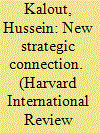

|
|
|
|
|
| Publication |
2014.
|
| Summary/Abstract |
Keen to establish itself as an actor with greater importance in global geopolitics, today's Brazil seeks a foreign policy in accordance with its present stature and aspirations. The country has emerged from the periphery of the international order to become a global player with an enhanced voice on the international stage, eager to ascend to the epicenter of the most powerful nations, and with some degree of influence upon the global system.
|
|
|
|
|
|
|
|
|
|
|
|
|
|
|
|
| 14 |
ID:
129204
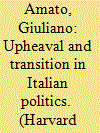

|
|
|
|
|
| Publication |
2014.
|
| Summary/Abstract |
Giuliano Amato is currently one of the 15 constitutional court judges of Italy, having served as the prime minister of Italy in the years 1992-93 and 2000-01. He also served as Minister of Interior and Treasurer during the Financial Crisis. He is often remembered as the treasurer who had the political strength to make a radical and controversial decision: withdrawing from people's bank accounts 6 per thousand of their capital, an economic operation aimed at rectifying the disastrous financial situation that Italy was facing at the time. He is one of the few politicians that have been prominent figures in Italian politics during both the First Republic (1948-1994) and the Second Republic (1994-present). His article is mainly about the thorny path he faced while transitioning between the two republics, largely due to a widespread political scandal. It depicts the uncertainty of the Italian politics as it was undergoing a deep change: several new political parties were forming in the beginning of the 1990s, and Italians put much faith in this transition. Amato was at the very forefront of this political renaissance, and has been a stand-out public figure throughout the turbulent last few decades of Italian politics.
|
|
|
|
|
|
|
|
|
|
|
|
|
|
|
|
| 15 |
ID:
129190
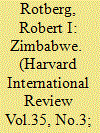

|
|
|
|
|
| Publication |
2014.
|
| Summary/Abstract |
What next? Following another marred election, what is to become of Zimbabwe? With alleged assistance rendous inflation by banning the Zimbabwe dollar as legal from Israel and China, President Mugabe was re-anointed president after a July election for another five-year term. He has been misruling Zimbabwe with an increasingly iron fist since 1980, governing since 1999 over a country with ever-diminishing GDP, many years of Weimar-like inflation, and deteriorating medical and educational outcomes. But Mugabe will be 90 in February. How long will he live? Who can succeed him?
|
|
|
|
|
|
|
|
|
|
|
|
|
|
|
|
|
|
|
|
|